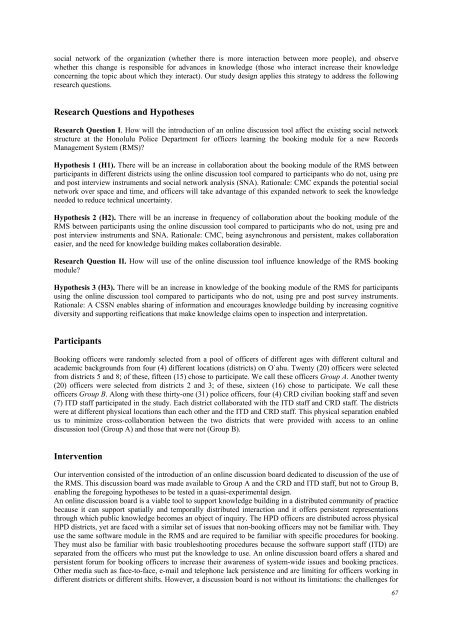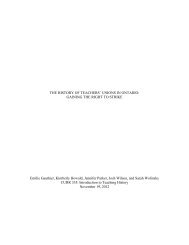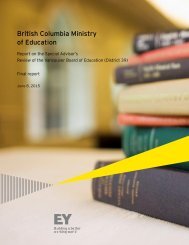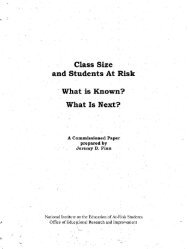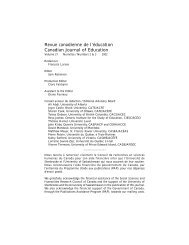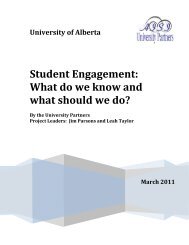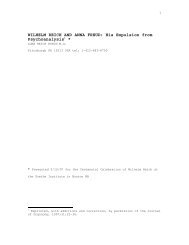October 2006 Volume 9 Number 4
October 2006 Volume 9 Number 4
October 2006 Volume 9 Number 4
Create successful ePaper yourself
Turn your PDF publications into a flip-book with our unique Google optimized e-Paper software.
social network of the organization (whether there is more interaction between more people), and observe<br />
whether this change is responsible for advances in knowledge (those who interact increase their knowledge<br />
concerning the topic about which they interact). Our study design applies this strategy to address the following<br />
research questions.<br />
Research Questions and Hypotheses<br />
Research Question I. How will the introduction of an online discussion tool affect the existing social network<br />
structure at the Honolulu Police Department for officers learning the booking module for a new Records<br />
Management System (RMS)?<br />
Hypothesis 1 (H1). There will be an increase in collaboration about the booking module of the RMS between<br />
participants in different districts using the online discussion tool compared to participants who do not, using pre<br />
and post interview instruments and social network analysis (SNA). Rationale: CMC expands the potential social<br />
network over space and time, and officers will take advantage of this expanded network to seek the knowledge<br />
needed to reduce technical uncertainty.<br />
Hypothesis 2 (H2). There will be an increase in frequency of collaboration about the booking module of the<br />
RMS between participants using the online discussion tool compared to participants who do not, using pre and<br />
post interview instruments and SNA. Rationale: CMC, being asynchronous and persistent, makes collaboration<br />
easier, and the need for knowledge building makes collaboration desirable.<br />
Research Question II. How will use of the online discussion tool influence knowledge of the RMS booking<br />
module?<br />
Hypothesis 3 (H3). There will be an increase in knowledge of the booking module of the RMS for participants<br />
using the online discussion tool compared to participants who do not, using pre and post survey instruments.<br />
Rationale: A CSSN enables sharing of information and encourages knowledge building by increasing cognitive<br />
diversity and supporting reifications that make knowledge claims open to inspection and interpretation.<br />
Participants<br />
Booking officers were randomly selected from a pool of officers of different ages with different cultural and<br />
academic backgrounds from four (4) different locations (districts) on O`ahu. Twenty (20) officers were selected<br />
from districts 5 and 8; of these, fifteen (15) chose to participate. We call these officers Group A. Another twenty<br />
(20) officers were selected from districts 2 and 3; of these, sixteen (16) chose to participate. We call these<br />
officers Group B. Along with these thirty-one (31) police officers, four (4) CRD civilian booking staff and seven<br />
(7) ITD staff participated in the study. Each district collaborated with the ITD staff and CRD staff. The districts<br />
were at different physical locations than each other and the ITD and CRD staff. This physical separation enabled<br />
us to minimize cross-collaboration between the two districts that were provided with access to an online<br />
discussion tool (Group A) and those that were not (Group B).<br />
Intervention<br />
Our intervention consisted of the introduction of an online discussion board dedicated to discussion of the use of<br />
the RMS. This discussion board was made available to Group A and the CRD and ITD staff, but not to Group B,<br />
enabling the foregoing hypotheses to be tested in a quasi-experimental design.<br />
An online discussion board is a viable tool to support knowledge building in a distributed community of practice<br />
because it can support spatially and temporally distributed interaction and it offers persistent representations<br />
through which public knowledge becomes an object of inquiry. The HPD officers are distributed across physical<br />
HPD districts, yet are faced with a similar set of issues that non-booking officers may not be familiar with. They<br />
use the same software module in the RMS and are required to be familiar with specific procedures for booking.<br />
They must also be familiar with basic troubleshooting procedures because the software support staff (ITD) are<br />
separated from the officers who must put the knowledge to use. An online discussion board offers a shared and<br />
persistent forum for booking officers to increase their awareness of system-wide issues and booking practices.<br />
Other media such as face-to-face, e-mail and telephone lack persistence and are limiting for officers working in<br />
different districts or different shifts. However, a discussion board is not without its limitations: the challenges for<br />
67


